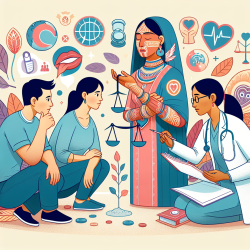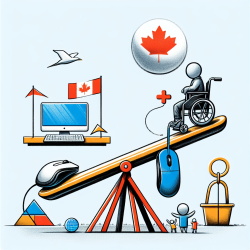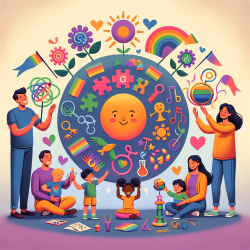Introduction
As practitioners dedicated to improving outcomes for children, it is essential to continually refine our skills and knowledge. The research article titled "The Effects of an Indigenous Health Curriculum for Medical Students" provides valuable insights that can enhance our understanding and practice. By examining the outcomes of this curriculum, we can draw parallels to our field and identify strategies to improve our cultural competency and empathy, ultimately leading to better outcomes for the children we serve.
Understanding the Research
The study assessed first-year medical students' Indigenous health knowledge, cultural intelligence, ethnocultural empathy, and social justice beliefs before and after a series of lectures. Results showed significant improvements in Indigenous health knowledge, with some gains in cultural intelligence and ethnocultural empathy. However, social justice beliefs and cultural humility showed less significant changes, indicating the need for more comprehensive training.
Implications for Practitioners
As speech-language pathologists, we can draw several lessons from this research:
- Continuous Learning: The improvement in knowledge among medical students highlights the importance of ongoing education. Practitioners should seek opportunities to learn about the cultural backgrounds of the populations they serve.
- Cultural Competency: Understanding cultural nuances can enhance communication and trust with clients and their families. Incorporating cultural competency training into professional development can improve service delivery.
- Empathy and Social Justice: While knowledge is crucial, empathy and social justice are equally important. Practitioners should strive to understand the broader social determinants affecting their clients' health and well-being.
Encouraging Further Research
The study suggests that while knowledge can be improved through lectures, other critical components of culturally appropriate care require more immersive experiences. Practitioners are encouraged to engage in further research and training that includes experiential learning opportunities. Collaborating with Indigenous communities and participating in service-learning projects can provide deeper insights and foster meaningful connections.
Conclusion
Incorporating the findings from this research into practice can enhance our ability to provide culturally sensitive and effective care. By prioritizing continuous learning, cultural competency, and empathy, we can contribute to reducing health disparities and improving outcomes for all children.
To read the original research paper, please follow this link: The Effects of an Indigenous Health Curriculum for Medical Students.










